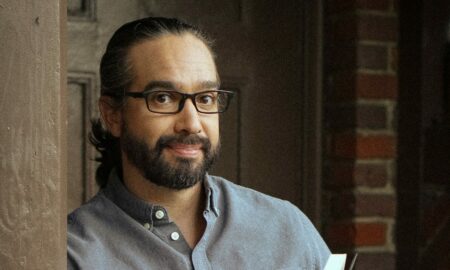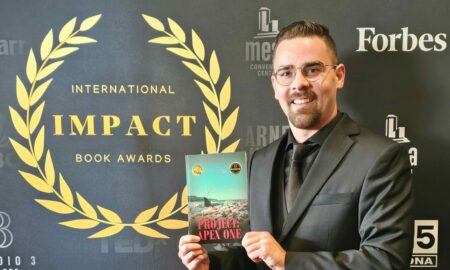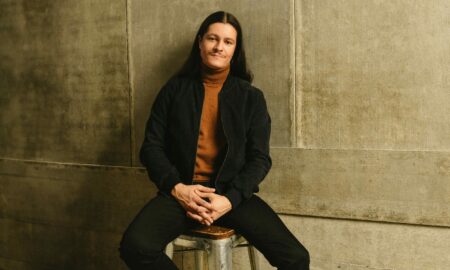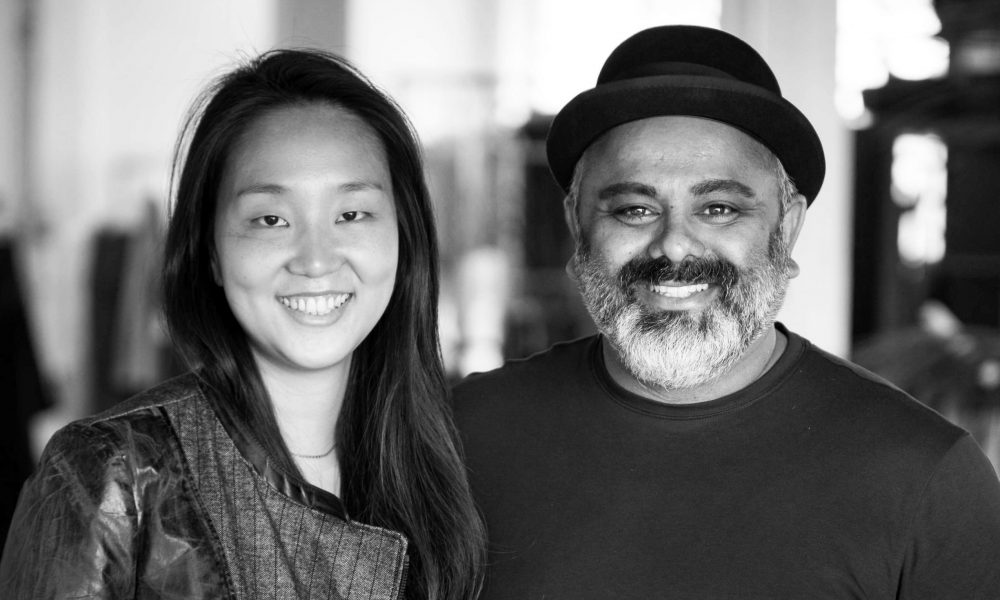

Today we’d like to introduce you to Chachi Prasad and Karam Kim.
Chachi and Karam, let’s start with your story. We’d love to hear how you got started and how the journey has been so far.
Prior to launching BlueCut, Karam and I developed a successful premium denim line bishop. We moved to Los Angeles from NYC in 2006, and made a home for ourselves in the Arts District. Our paths crossed when we met on a blind date in NYC while she was working at Yigal Azrouel and I was working at Oscar by Oscar de La Renta. In 2009 we attracted the attention of the culinary industry when restaurateurs and chefs alike commissioned us to design a line of boutique-esque aprons that exuded the same cool and polished style we had developed a reputation for. We were absolutely flattered to be working with creatives on another scale. Due to demand, in 2014 we naturally transitioned from the denim industry and evolved into the apron industry as BlueCut.
BlueCut was created to offer a line that served as an alternative to the humdrum linen-service commodity wear, which had been the norm for ions. We took our knowledge of tailoring and textiles to compose a cool and modern look for the culinary industry. Our aprons are worn by many different users, including, artist, painters, mechanics, cobblers, and home cooks.
We love sitting with other creative minds in the culinary industry. We’re also big foodies who appreciate some of these spaces, which encompass the talents, so it’s a perfect marriage.
We have many fans and clients who are from the top restaurants all over the globe. Chef Michael Chiarello, of Bottega, Nappa Style, and Chiarell Vinyards has said “I adore BlueCut aprons so much that I purchased them for all of the chefs in my restaurants. I not only love the functionality of the clasp, but they’re comfortable and make you look like a badass. These aprons are epic!”
We are extremely grateful and inspired when someone like Chef Chiarello makes such a comment about our aprons. We create a customized expression of your restaurant or establishment, while maintaining a stylish and modern look.
BlueCut’s philosophy has been to create the best product in the industry while maintaining a reputation of quality and workmanship. Maintaining our integrity allows us to cultivate our reputation.
We are proud to be made in the USA. All of our manufacturing takes place, at our factory in South Los Angeles, where we previously produced our denim line.
BlueCut aprons and chef gear are handcrafted using the finest fabrics from Japan, Europe and the USA. We currently sell to over 350 establishments and also sell to home chefs, artists, mechanics etc. online which has seen some exponential growth.
Overall, has it been relatively smooth? If not, what were some of the struggles along the way?
We’ve financed the company ourselves, and have done much of the work on our own. We had a great product but didn’t have big budgets to put into marketing nor did we have the connections in the culinary industry, so it was a challenge to get BlueCut out in the market. We were very fortunate that Chefs, and other industry people found out about BlueCut through each other and very much started supporting us. I think they loved the fact that we were originals and made the best aprons and kitchen gear ever seen.
Karam and I had been a connected at the hip working team since 2003, but after the birth of our daughter Evan in 2016, Karam had to focus on attending to our daughter. It took us a while to get used to not having each other.
One other struggle we’ve experienced has been on the infringement of our designs by competitors, from our two-tone neck strap on the aprons, to even launches of new products. The two-tone neck strap is a staple on many of our styles and were the first apron company to offer this element, which is now being copied by one competitor in specific. We have applied for some design protection from the USPTO, so we will see where this goes.
We’ve had challenges of finding proper operators to do small quantities in the beginning until we grew our business to do bigger quantities. Once we grew the business, we had challenges to find additional factories to help us with production due to work loads. It’s challenging to set up factories to work on your product the way you like to see it at the end. It’s the same as if a Chef has a new team in a new kitchen and they are asked to make his dishes. It takes time getting use to others flow.
There are many challenges ahead for us. The increase in minimum wage again next year will warrant a 30% increase in costs. This is a big challenge. because most clients are very price conscious and they would be hesitant on a price increase. Can we add a service charge on the invoices like the restaurants? Fat chance…
I’ve sat in on many of the meetings with clients and we are lucky that we can pick whom to work with these days. There have been times where we have walked away from projects, due to the customers just being difficult and not respecting my workers time or our company’s. In any business or industry, you have those few that place themselves on pedestals and expect everyone to pivot on a dime. This is a big problem for anyone, especially the ones first starting out and willing to do anything to receive an order. I once sat in a meeting (not going to say who) discussing design of their space, including the colors, and materials, which needed to evolve into the apron elements somehow. We gave a great custom design and a price 20% lower than other quotes they received from another vendor. It was still too high. I stopped and looked around the space and asked them, “you’re spending 100k on marble bar top, which I think the customers will care less about, then how your team looks.” It didn’t make sense to me why you wouldn’t spend money on one of the biggest impressions, which would leave a lasting impact on the customers. So, sometimes you walkway from the silliness.
It takes a long time to close on a project due to custom requests from a lot of our customers. There are usually several decision makers in restaurant business and it takes time to get response from customers. Besides that, most of customers request samples before going into production.
We see ourselves as creators and do everything from scratch… I guess just like a Chef would create a dish from scratch.
We’ve gone through struggles like many other businesses.
Ori Menashe of Bestia, Christian Page of Cassell’s, and of course Chef Ilan Hall of Ramen Hood, were such big supporters and fans. We owe them a great deal of gratitude for showing us a proper path, being such humble Chefs, and good friends.
We wouldn’t be here without the support we’ve received from many, including Chefs, restaurateurs, kitchen staff, front of the house, back of the house and all who participate. I make sure to know everyone who is working in a restaurant, whether they are in front of you or not. Each person is a key player and a contributor to the success of the establishment, so they should equally be heard and acknowledged. We run our business in the same manner.
BlueCut – what should we know? What do you guys do best? What sets you apart from the competition?
We do everything is literal. I mainly oversee everything, from design, manufacturing, sales and marketing. Karam helps me with design, technical aspects of manufacturing and marketing. We discuss everything together about work when we are home which is an extension of my work. My day starts at the factory to check what’s on the production and sample line. Checking for quality and workmanship for each piece is what we expect. I also visit our fabric suppliers and mills and to work on developing fabrications for projects.
At the same time I am overseeing our denim line bishop, which we are relaunching in Fall 2018 for men’s. We have partnered with a global distributor who will oversee all aspects of the sales. We are very excited about this, because it will just help BlueCut progress into additional pathways.
Some of our key strengths are an extension of our experience as designers in high-end apparel, developing textiles, tailoring, and manufacturing. We love the ease of simple yarns such as cottons, but we also love the technical fabrics that have seen some movement through ideas channeled by our clients. Ori Menashe of Bestia inspired us to develop a fabric weaved with denim and kevlar. The selvedge denim which is weaved with kevlar is one of the strongest fabrics we have in our arsenal.
It’s not for everyone, but when you put it on, it’s like wearing an armor when going into battle. It’s extremely durable, heat resistant, very hard to cut with a knife and fire retardant when reversed. We are very proud of this Kevlar weaved product that we are developing a line consisting of only this material. From knife rolls, bags, gloves, aprons and a host of other products. It has a lifetime guarantee.
What sets us apart from many others is providing our extensive knowledge in design, development and manufacturing to our customers. We provide consulting on different levels to new and established clients to make their brand outstanding.
We’re not chefs pretending to be designers nor are we designers pretending to be chefs. We are simply designers who create the coolest gear in the industry.
What is “success” or “successful” for you?
How do I define success? I believe that when you aren’t having to please people, then you have hit the mark. I witness too many individuals these days trying to get noticed or please everyone around them. I think when you are able to forgo the later you have become a success. I’ve never thought of success being the traditional rewards.
Can I keep doing this work if I lose everything and need to start over. If the answer is yes then you are on the right path to success because you have a real passion for your work.
Another marker is you making sacrifices, and I don’t mean giving up a snack. Are you giving up your time and energy to making an idea or goal into something significant, when others may not believe in you or do not care.
Let’s face it we all get up sometimes and want to bang our heads on the wall and go back to sleep, but we still have to face the day and people. If you have a true passion for what you do, you don’t second guess the day ahead. It’s a driving factor that instinctively advises you with no second guessing. And I don’t mean habit, because there is a clear distinction between a habit and passion.
In the past Karam thought success only derives from your accomplishments from your work. But success comes from having a balance with your work. Success from work can come and go, but there are constants such as your family, who will always be there.
Pricing:
- Mason Kevlar Selvedge Denim – $179.00 Retail
- Parker – $70-$85 Retail
- Hatfield – $80-$92 Retail
- Mason Selvedge Denim – $94-$98 Retail
- El Jefe – $85 Retail
Contact Info:
- Address: 930 South Alameda St.
Los Angeles, Ca 90021 - Website: www.bluecutaprons.com
- Phone: 213-689-7772
- Email: [email protected]
- Instagram: https://www.instagram.com/bluecutaprons/
- Facebook: https://www.facebook.com/bluecutaprons
- Twitter: https://twitter.com/bluecutaprons
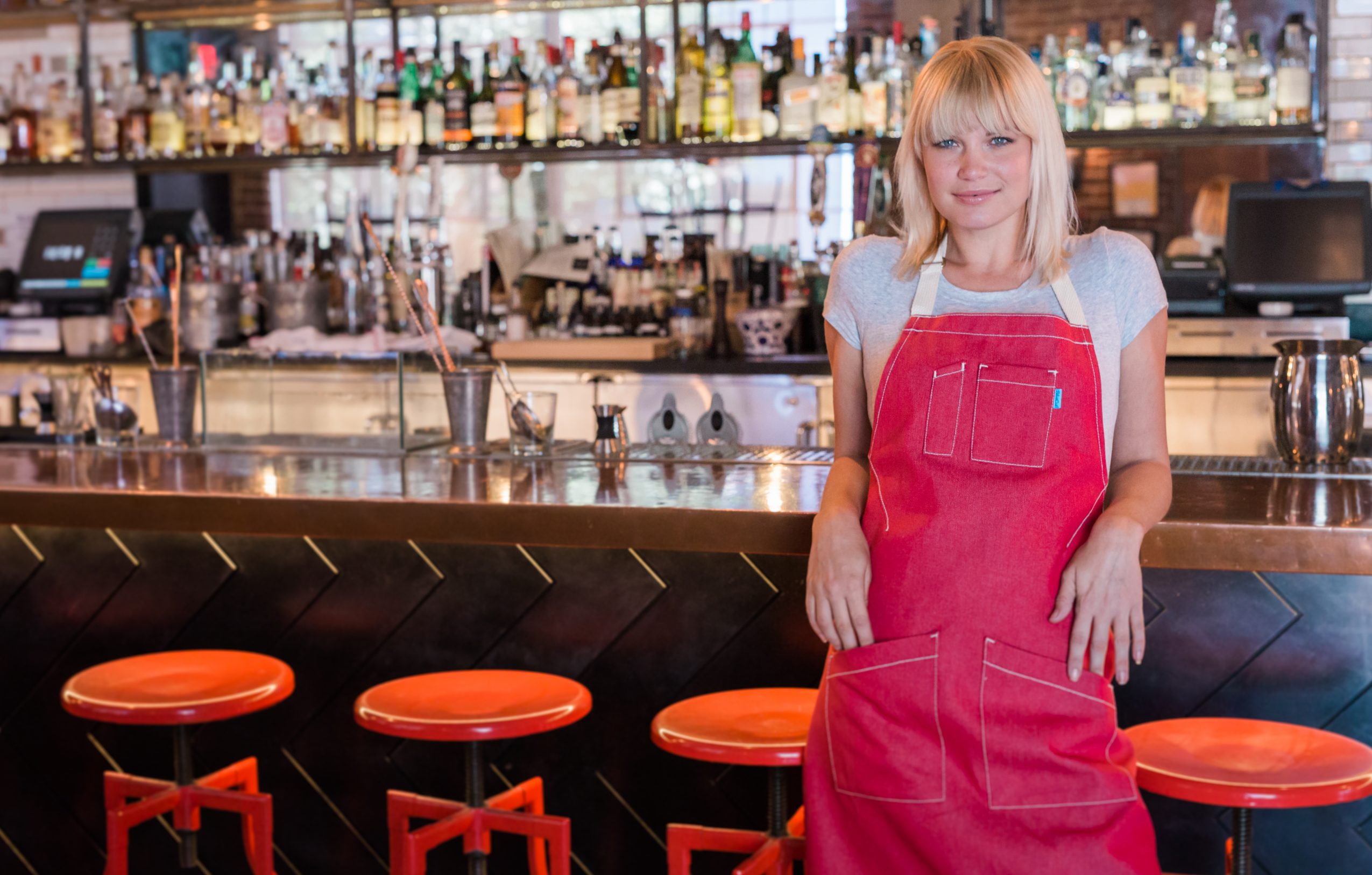

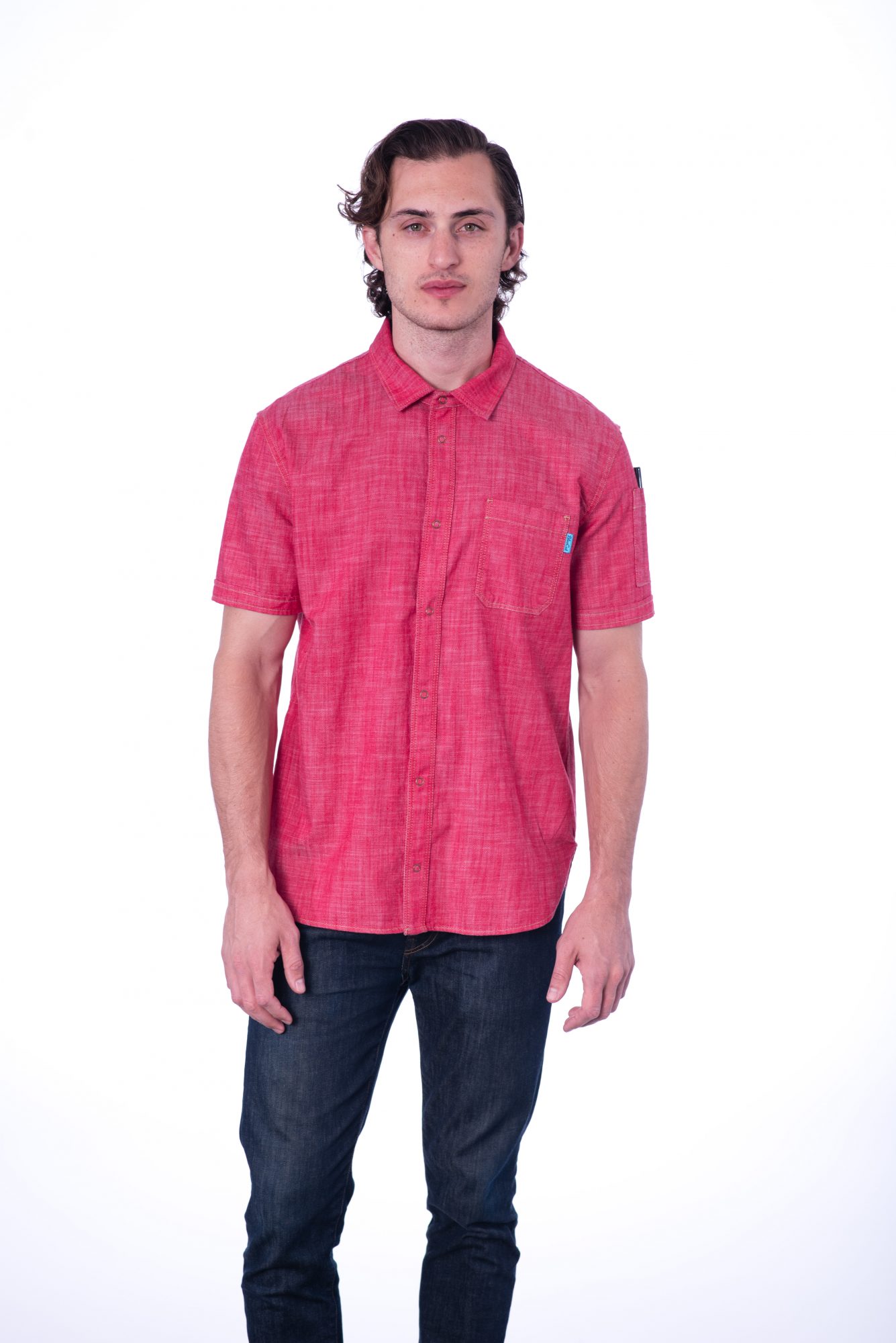
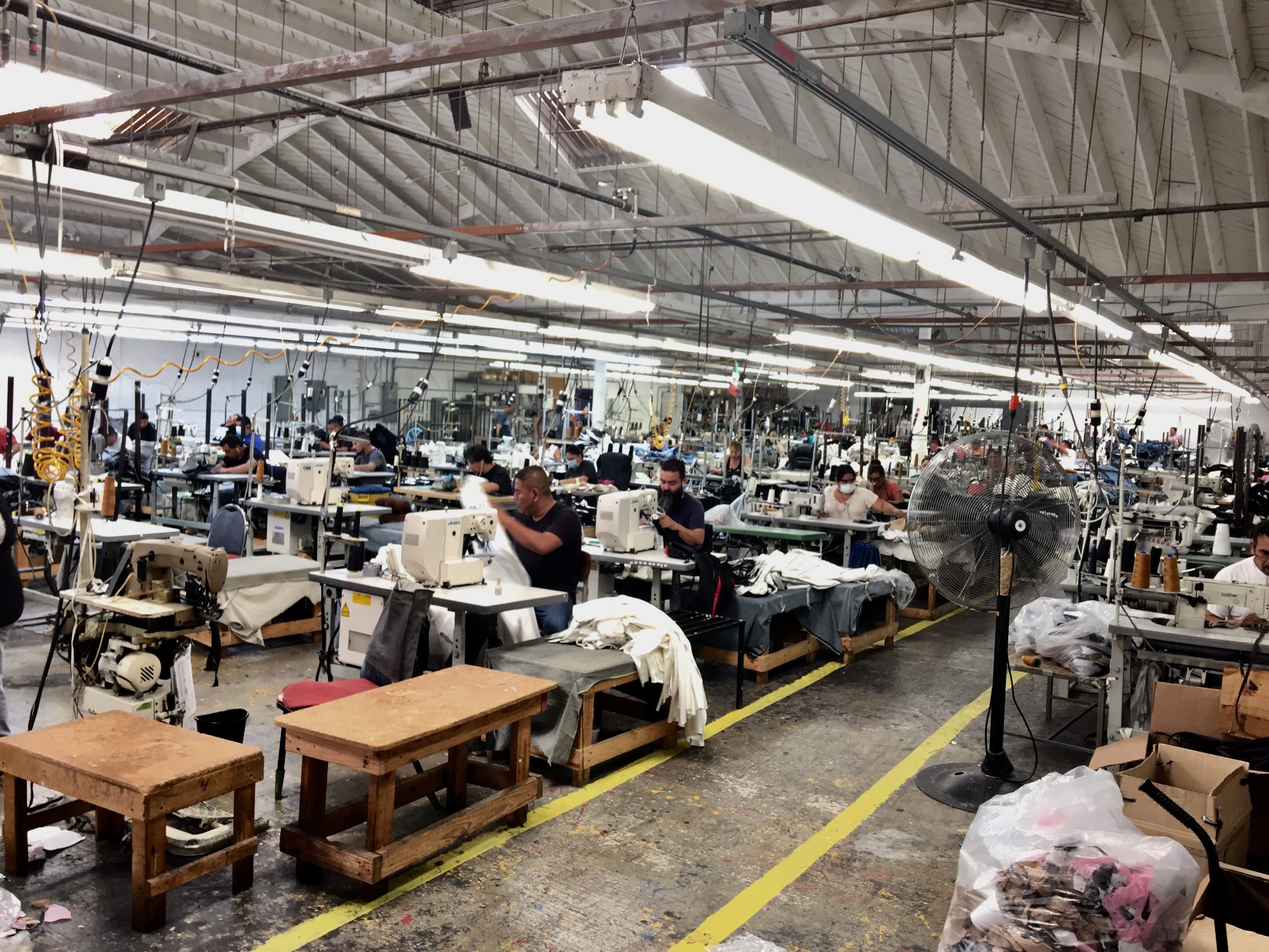
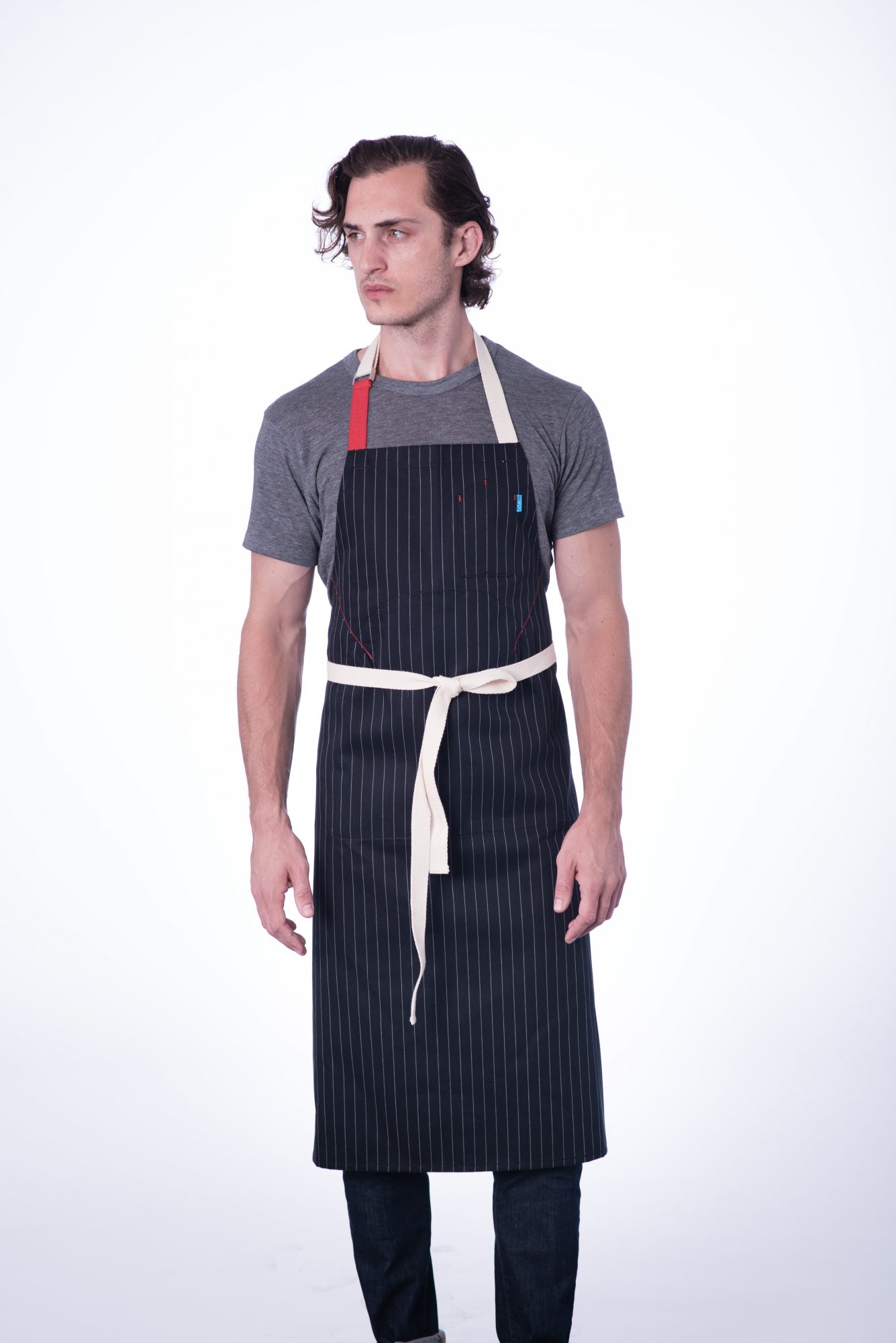
Image Credit:
Alexander Richardson
Greg Gainor
Getting in touch: VoyageLA is built on recommendations from the community; it’s how we uncover hidden gems, so if you know someone who deserves recognition please let us know here.














